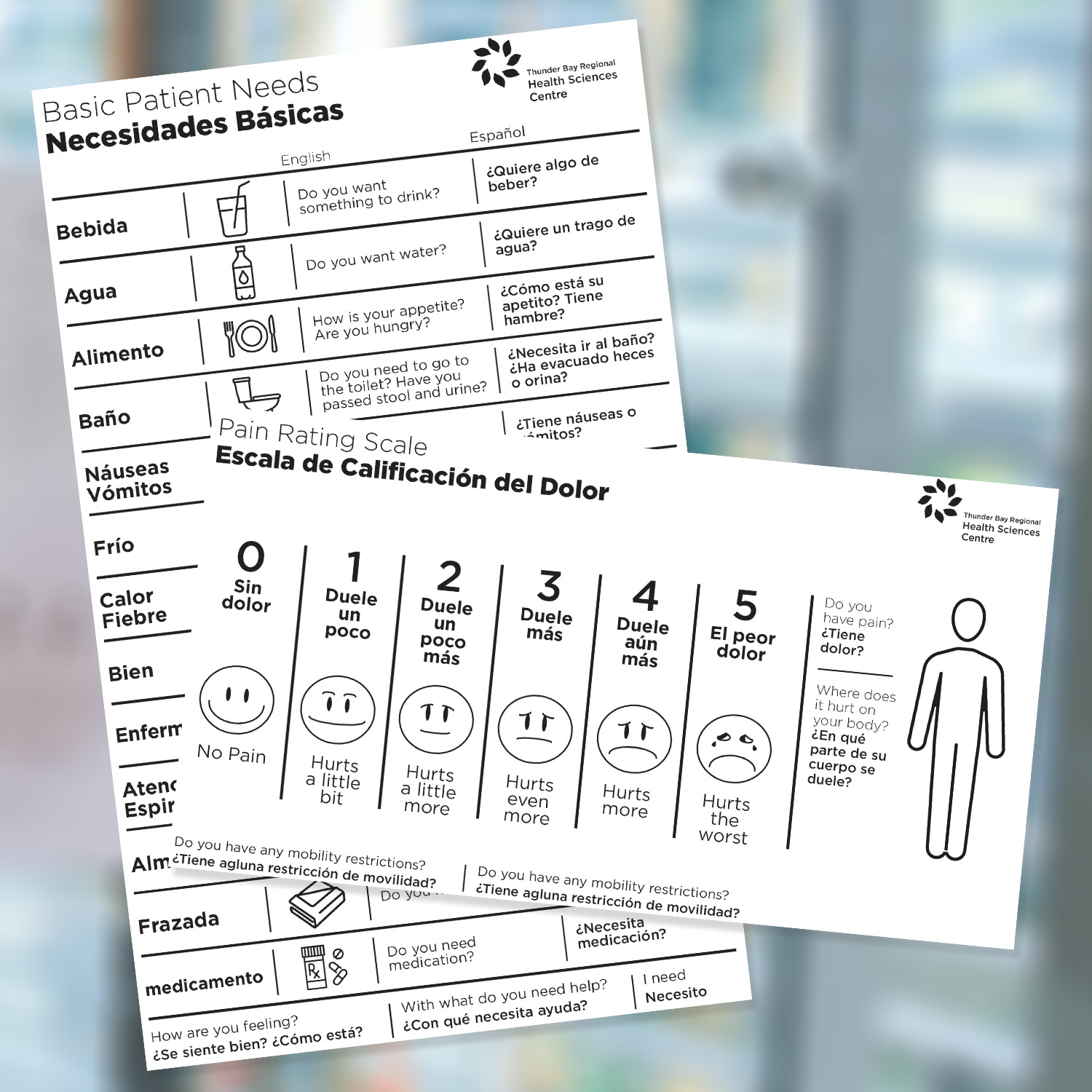Care Communication Cards Provide “Communication First Aid” for Non-English-Speaking Patients
Published Wednesday, September 4, 2024

Terry Fode, Patient Safety Improvement Specialist, Quality and Risk Management presents a mock-up of the Spanish-language Care Communication Card.
Family CARE Grant Brings Ingenious Homegrown Solution to Life
Communication plays a huge role in patient care – and it's a role we often take for granted. For example, think about your own visits to the Emergency Department. The first thing you do is tell the nurse what the problem is. However, even basic questions such as “Where does it hurt?” and “Did you hit your head?” can easily get lost in translation if patient and healthcare professional speak different languages.
Thanks to an ingenious homegrown idea and a Family CARE Grant to support it, our Hospital will soon have a way to communicate the basics quickly and effectively with patients in different languages.
In 2021/2022, there were 117 documented interactions at the Thunder Bay Regional Health Sciences Centre that required outsourced interpretation services, as our Hospital is able to access 24/7 interpretation services. However, finding an interpreter can take time – time that patients don't always have in emergency situations.
Terry Fodë, Patient Safety Improvement Specialist in the Quality & Risk Management Department, said providing culturally appropriate care is equivalent to safe care, and being able to communicate the needs of a patient can help provide better care.
“Sometimes all you need are a few words to convey a message,” Fodë said.
Fodë, who is also a linguistics specialist, proposed Care Communication Cards to communicate immediate basic needs. The cards would help healthcare professionals at our Hospital understand where it hurts, how much it hurts, whether there is vomiting, and so on. Patients could also communicate their needs such as bathroom, food, water, and pillow. It's sort of a “communication First Aid” to help patients sooner while the team is waiting for interpretation services to connect.

The cards are modelled after Ojibway tools that the Cancer Centre's Indigenous Patient Navigator designed. Fodë plans to create a series of laminated cards for several different languages including French, Italian, Finnish, Spanish, Arabic, Farsi, Mandarin, and Hindi. A separate card for non-verbal patients will use pictograms provided by the Aphasia Institute. Clinical Staff and the Patient Family Advisor Council provided feedback to ensure the Care Communication Cards make sense from both clinical and patient perspectives.
Fodë will use a Family CARE Grant to translate, print and laminate those cards, making them easy to disinfect and reuse.
“Initially we will provide Care Communication Cards of the most common languages required as identified by staff, and create a digital library,” Fodë said. “Additionally, I'm creating cards with the English word and the pictogram, but including a blank space. If there's a language we don't have available and an essential care partner can provide us with the translation, we can then add it to our library.”
What makes this solution particularly effective is that it is low-tech. Translation apps rely on Internet connections and third-party companies, both of which can be finicky. Besides, Fodë said, those high-tech translations aren't always accurate.
“Language can be so nuanced,” Fodë said. “The Care Communication Cards keeps it simple.”
The Thunder Bay Regional Health Sciences Foundation's Family CARE Grant provides funding for frontline employees to fund their own ideas for patient care improvements. In fact, “CARE” stands for “Care Advancements Recommended by Employees.” These grants are funded by donors like you who understand that little things can make a big difference to patient care.
Learn more including how you can donate to this amazing grant program by visiting: https://www.healthsciencesfoundation.ca/familycare
Article by Graham Strong